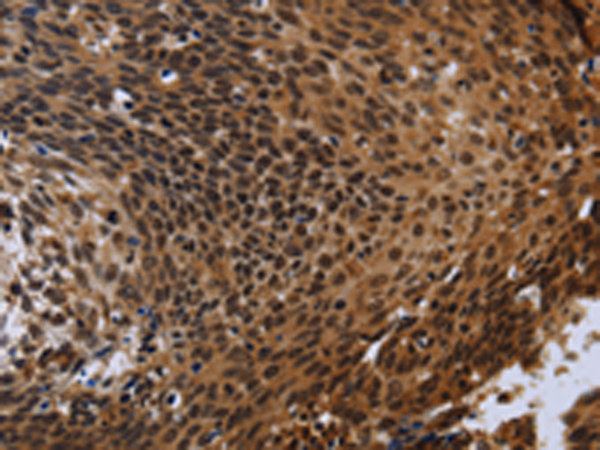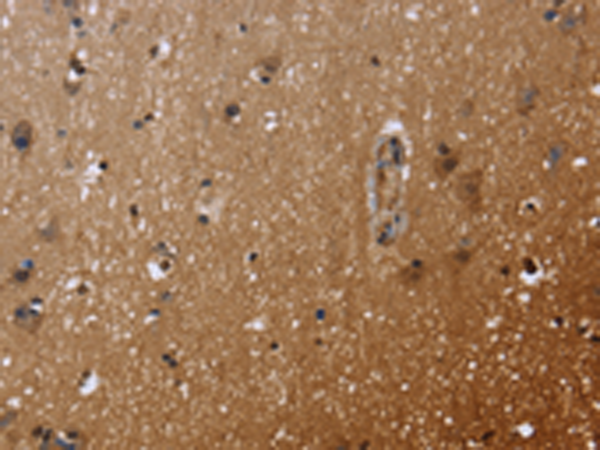


| WB | 咨询技术 | Human,Mouse,Rat |
| IF | 咨询技术 | Human,Mouse,Rat |
| IHC | 1/50-1/200 | Human,Mouse,Rat |
| ICC | 技术咨询 | Human,Mouse,Rat |
| FCM | 咨询技术 | Human,Mouse,Rat |
| Elisa | 1/2000-1/10000 | Human,Mouse,Rat |
| Aliases | SLIM2 |
| WB Predicted band size | 31 kDa |
| Host/Isotype | Rabbit IgG |
| Antibody Type | Primary antibody |
| Storage | Store at 4°C short term. Aliquot and store at -20°C long term. Avoid freeze/thaw cycles. |
| Species Reactivity | Human, Mouse |
| Immunogen | Fusion protein of human FHL3 |
| Formulation | Purified antibody in PBS with 0.05% sodium azide and 50% glycerol. |
+ +
以下是关于FHL3抗体的3篇文献概览,涵盖其功能及抗体应用场景:
---
1. **文献名称**:*FHL3 suppresses gastric cancer progression by inhibiting cell proliferation and epithelial-mesenchymal transition*
**作者**:Zhang Y, et al.
**摘要**:本研究利用FHL3抗体通过Western blot和免疫组化(IHC)技术,发现FHL3在胃癌组织中表达显著下调。实验表明,FHL3过表达可抑制胃癌细胞增殖和转移,其机制可能与调控Wnt/β-catenin信号通路有关。
2. **文献名称**:*FHL3 interacts with MyoD and enhances myogenic differentiation*
**作者**:Sun L, et al.
**摘要**:通过免疫共沉淀(Co-IP)和免疫荧光技术结合FHL3抗体,研究发现FHL3与肌源性分化关键因子MyoD直接结合,促进成肌细胞分化。敲低FHL3导致肌肉特异性基因表达降低,提示其在骨骼肌发育中的关键作用。
3. **文献名称**:*FHL3 as a novel biomarker in ovarian cancer: Correlation with patient prognosis*
**作者**:Wang H, et al.
**摘要**:使用FHL3抗体对卵巢癌组织芯片进行染色,发现FHL3低表达与患者不良预后显著相关。体外实验证实,FHL3通过抑制PI3K/AKT通路降低癌细胞对化疗药物的耐药性。
---
**提示**:如需具体实验中的抗体品牌或应用细节(如一抗稀释比例、克隆号),建议结合文献方法部分或联系原作者补充。
**Background of FHL3 Antibody**
The FHL3 (Four and a Half LIM Domains 3) antibody is a tool used to detect and study the FHL3 protein, a member of the four-and-a-half-LIM-only protein family. FHL3 contains four LIM domains and a half-LIM motif, which mediate protein-protein interactions and regulate cellular processes like signaling, proliferation, and differentiation. Primarily expressed in skeletal muscle, heart, and certain cancer tissues, FHL3 functions as a transcriptional co-regulator, interacting with transcription factors (e.g., MyoD, Runx2) and modulating pathways involved in muscle development, osteogenesis, and tumor progression.
Research highlights its dual roles in cancer: FHL3 can act as a tumor suppressor (e.g., inhibiting gastric or liver cancer growth) or promoter (e.g., enhancing colorectal cancer metastasis), depending on cellular context. Its involvement in muscle regeneration and fibrosis also makes it relevant in muscular dystrophy and cardiovascular studies.
The FHL3 antibody is widely used in techniques like Western blotting, immunohistochemistry, and immunofluorescence to assess protein expression, localization, and interactions. Validating antibody specificity is critical due to homology among FHL family members. Recent studies explore FHL3’s potential as a diagnostic biomarker or therapeutic target, emphasizing its context-dependent roles in health and disease.
×